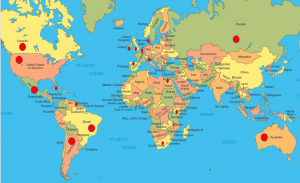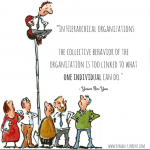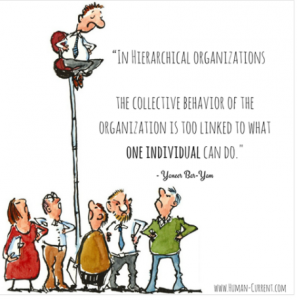It may still not be obvious to all organizations and corporations, but they urgently need to come to terms with complexity and its implications. Most organizations are already feeling complexity biting but they don’t know how to identify it or how to manage it. That’s not surprising. The term complexity is often misunderstood. It doesn’t mean complicated. In scientific terms it refers to a reality where it’s no longer possible to boil things down to their individual constituents. You can’t cut through complexity or break it down because new properties emerge from interdependencies. The whole is always much greater than the sum of the parts.
Traditional hierarchies don’t work
So what does this mean practically for organizations? We’ve known it for years and we keep repeating it. Traditional hierarchies and company functions don’t work any more. They belong to a bygone era, one before complexity when things were simpler. It was a pleasure to listen to Prof. Yaneer Bar Yam, Director of the New England Complex Systems Institute on this subject in a Human Current podcast ‘Complexity Science is Everyone’s Science‘. (Thanks to Human Current also for the cartoon.) Complexity, Bar Yam points out, is too much for one individual in a hierarchy. While we’re beginning to see some changes in corporations, healthcare, education and government have trouble keeping up with the need for flatter organizations and so they are ‘broken’. He stresses that organizational structures are not changing fast enough to respond to increasing complexity.
Structures that work
It was exciting to hear one of the top scientists in complexity talking about the need for organizational structures to work in teams and to allow cooperation beyond the command of just one person. This has been our focus at Intelligent Management for years and right now we are excited to be working with not only enterprises but also a public body that, in spite of the challenge of a public administration mindset, has chosen to make the shift away from silos towards the network of projects structure to serve citizens better. To quote Bar Yam – we can’t work in silos to solve systemic problems. This is true both at international and government level and within organizations. Harnessing the diversity that is the strength of teams and creating the cooperation that Bar Yam refers to is not just something we should aspire to. In our experience it can be made operational through creating pools of competencies that can be lent to projects as required.
The Human Constraint
A major stumbling block to the kind of transformation required to shift from managing organizations in silos to managing organizations as complex systems lies in our cognitive ability to cope with change. We discuss this at length in our books and I have dedicated an entire business novel to the subject called ‘The Human Constraint‘. I’m proud to say that so far readers from 18 countries around the world have purchased it.
We are deeply grateful to all those who purchase the books. They contribute directly to the ongoing research and on-the-field development of the systemic organization.

BTW here is a link to my own interview with the Human Current podcast. The episode is called ‘Harnessing System Potential’.
Sign up to our blog here and shift your thinking towards broader, systemic possibilities for yourself and your organization.
About the Author
Angela Montgomery Ph.D. is Partner and Co-founder of Intelligent Management, founded by Dr. Domenico Lepore. She is co-author with Dr. Domenico Lepore and Dr. Giovanni Siepe of ‘Quality, Involvement, Flow: The Systemic Organization’ from CRC Press, New York. Angela’s new business novel+ website The Human Constraint looks at how the Deming approach and the Theory of Constraints can create the organization of the future, based on collaboration, network and social innovation.







Its good thought and it is true that we cant go more with this traditional way of organizing the people in the company. I agree to see it through the process which I call as a process-based organization, a dynamic organization which always adapt to its environment in a systemic way